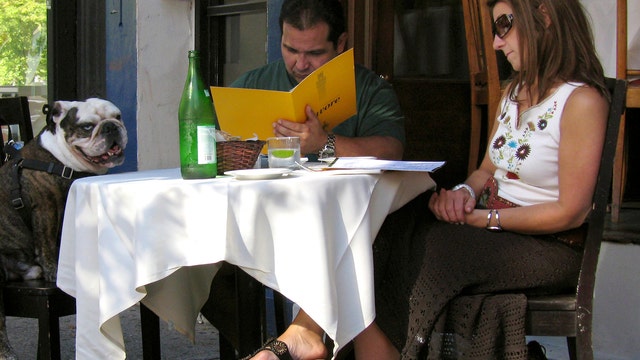Outdoor Dining Crackdown in NYC and Philly
In New York City and Philadelphia, city governments are cracking down on restaurants with sidewalk seating, just as the outdoor-dining season kicks off.
Seventeen restaurants in New York City received notices this week from the Department of Consumer Affairs threatening shutdown if certain new guidelines aren’t met within 100 days. While in Philadelphia, Streets Commissioner David Perri has started conducting monthly inspections of sidewalk cafes, with $75 fines for restaurants blocking sidewalks or causing congestion.
“For some clients, the sidewalk café is 80% of the restaurant,” says Joseph Levey, a lawyer representing some of the NYC restaurants facing a shutdown. “If you took away the sidewalk cafes, it would be taking away their businesses.”
NYC Restaurants Fight Back
A spokesperson from NYC’s Department of Consumer Affairs calls sidewalk cafes “a thriving addition to communities throughout the city,” and says the department is trying to address the concerns of the City Council and the Community Board, while working with the cafes to make sure their cafes are legal.
But Levey says there’s no question that his clients’ outdoor sections are legal – and the process involved in proving the legality will be stressful and expensive for restaurant owners.
He says the notice gave restaurant owners three options: prove that zoning requirements allow a sidewalk café, prove that the business has a zoning exemption or shut down the café.
“They’ll have to go out and find surveyors and architects, and pull old filings – there’s money outlay on the experts,” says Levey. “If you don’t do any of those things, inspectors will come – I don’t know if there will be fines or if they’ll just shut down them down.”
Levey argues his clients’ ability to operate outdoor cafes should be grandfathered in, even if zoning laws have been changed in their neighborhoods to prohibit sidewalk seating.
The outdoor seating at Sant Ambroeus, which received a DCA notice, is “completely integral” to the restaurant, says Sant Ambroeus lawyer Robert Bookman.
“They never would have taken the space in the first place,” he adds, had they not been legally allowed to set up tables outside.
It’s not just about the profit gained from an extra few tables – the restaurants’ management say outdoor seating is an important marketing tool that helps them stand out from New York City’s other establishments.
Levey says the outdoor seating is part of the “identity” of the restaurants he represents. At Friend of a Farmer, a Gramercy Park restaurant that received a notice, manager Ardina Cerra says, “even if [pedestrians] have no intention of coming here, they might walk by and decide to stay, because it’s nice to sit outside.
“It’s only 8 tables, but people love to sit outside,” she says, adding that the outdoor seating brings in “thousands and thousands of dollars” each summer.
Cerra says she is surprised by DCA comments suggesting community members complained about the outdoor seating. She calls Friend of a Farmer’s relationship with its neighbors “phenomenal.”
“We have great customers, great regulars – some who come in three to four times a week,” she adds.
Philadelphia’s Pedestrian Complaints Lead to City Action
Streets Commissioner Perri says Philadelphia has nearly 400 restaurants with outdoor seating – and it was getting a little too crowded.
“We were getting complaints about blocked sidewalks, and we were witnessing cafes expanding beyond the approved limits,” says Perri. “Folks in wheelchairs and pushing strollers had to walk in the streets to get around the cafes.”
As a result, his department has stepped up inspections so that each restaurant with a permit for outdoor seating will be checked monthly.
“If there are repeat violations, we can take action against the license, refuse to renew the license or revoke it for the current year,” he warns. So far, he says 70 tickets have been given out.
At Soho Pizza and Bar, senior staff member Tom Pelkowski says the restaurant has received warnings about the outdoor seating. “We haven’t been fined yet, but we’ve come close,” he says.
Pelkowski says the extra seating the outdoor space provides is extremely beneficial to the restaurant.
“We wouldn’t be able to hold big parties inside if we didn’t have outdoor seating – it contributes a lot,” says Pelkowski.
San Diego Welcomes Outdoor Dining
In contrast to the crackdowns in New York City and Philadelphia, San Diego is loosening up rules for restaurants who want to provide outdoor seating.
Earlier this month, the San Diego City Council shortened the approval process for sidewalk seating permits, and lowered the cost associated with the permits, which could run anywhere from $9,000 to $12,000.
The decision came after a year of campaigning from local restaurant owners and the San Diego branch of the California Restaurant Association.
Michael McGeath, owner of the San Diego restaurant Brooklyn Girl, says the $9,000 it would have cost to add 6 tables outside was “absolutely prohibitive.”
As a board member of the California Restaurant Association chapter, McGeath helped argue on behalf of the city’s restaurants for lower fees. The new fee will cost only $1,250.
“I’m going to be first in line to get the permit,” says McGeath, who believes the outdoor dining will help bring exposure to his restaurant.
Alchemy restaurant owner Matt Thomas agrees with McGeath, and is also planning to add outdoor seating now that the cost is lower.
“For 8 tables, it would have cost $10,000,” says Thomas. “It’s an important marketing tool, and customers want it in a family-friendly neighborhood.”
And McGeath plans to spread the good fortune, as he expects the extra seats will bring in enough business – and revenue-- to allow him to hire more staff.
“I plan to hire 6 more employees … take some more people off of unemployment,” he says.




















